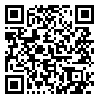Volume 28, Issue 2 (4-2025)
J Arak Uni Med Sci 2025, 28(2): 107-111 |
Back to browse issues page
Download citation:
BibTeX | RIS | EndNote | Medlars | ProCite | Reference Manager | RefWorks
Send citation to:



BibTeX | RIS | EndNote | Medlars | ProCite | Reference Manager | RefWorks
Send citation to:
Mikelani Akhoreh Ouliaei M, Farhad F, Sarlak H. Attitude of Dentists Regarding the "Parental Presence/Absence Technique" During Pediatric Dental Treatmen. J Arak Uni Med Sci 2025; 28 (2) :107-111
URL: http://jams.arakmu.ac.ir/article-1-7835-en.html
URL: http://jams.arakmu.ac.ir/article-1-7835-en.html
1- Undergraduate Student of Dentistry, School of Dentistry, Student Research Committee, Arak University of Medical Sciences, Arak, Iran
2- Assistant Professor, Department of Pediatric Dentistry, School of Dentistry, Arak University of Medical Sciences, Arak, Iran
3- Assistant Professor, Department of Pediatric Dentistry, School of Dentistry, Arak University of Medical Sciences, Arak, Iran ,dr.hamidsarlak@yahoo.com
2- Assistant Professor, Department of Pediatric Dentistry, School of Dentistry, Arak University of Medical Sciences, Arak, Iran
3- Assistant Professor, Department of Pediatric Dentistry, School of Dentistry, Arak University of Medical Sciences, Arak, Iran ,
Abstract: (2478 Views)
Introduction: Considering parents' preferences and opinions is an important factor in dentists' choice of treatment techniques. Despite the relatively low attitude of parents towards the use of the "parental presence/absence" technique, dentists still use this technique during pediatric dental treatment. The present study was conducted with the aim of simultaneously investigating the dentists' attitudes regarding the "presence/absence of parents" technique during the treatment of 4-10-year-old children and determining the factors affecting this attitude.
Methods: In this cross-sectional study, the attitudes of 83 dentists regarding the "presence/absence of parents" technique were evaluated using an investigator-designed questionnaire. The questionnaire scored dentists' attitudes regarding the above technique and evaluated the background factors affecting the child's attitude. Data were analyzed with a significance level of 0.05.
Results: The mean attitude score of the participants was 60.61±12.99. Also, 55.4% of participants considered this technique "unsuccessful". The factors "type of treatment", "child's age", "child's behavior", "parental behavior" and "implementation of the presence/absence technique", significantly affected the participants' attitudes.
Conclusions: Dentists do not hold a highly positive attitude toward the "presence/absence of parents" technique. According to dentists working in pediatric dentistry, this technique has low success in guiding children’s behavior.
Methods: In this cross-sectional study, the attitudes of 83 dentists regarding the "presence/absence of parents" technique were evaluated using an investigator-designed questionnaire. The questionnaire scored dentists' attitudes regarding the above technique and evaluated the background factors affecting the child's attitude. Data were analyzed with a significance level of 0.05.
Results: The mean attitude score of the participants was 60.61±12.99. Also, 55.4% of participants considered this technique "unsuccessful". The factors "type of treatment", "child's age", "child's behavior", "parental behavior" and "implementation of the presence/absence technique", significantly affected the participants' attitudes.
Conclusions: Dentists do not hold a highly positive attitude toward the "presence/absence of parents" technique. According to dentists working in pediatric dentistry, this technique has low success in guiding children’s behavior.
Type of Study: Original Atricle |
Subject:
Oral and Maxillofacial Medicine
Received: 2024/10/8 | Accepted: 2024/12/31
Received: 2024/10/8 | Accepted: 2024/12/31
References
1. AlDhelai TA, Khalil AM, Elhamouly Y, Dowidar KM. Influence of active versus passive parental presence on the behavior of preschoolers with different intelligence levels in the dental operatory: a randomized controlled clinical trial. BMC Oral Health. 2021;21(1):420. pmid: 34454468 doi: 10.1186/s12903-021-01781-z.
2. Afshar H, Baradaran NY, MahmoudI GJ, Paryab M, Zadhoosh S. The effect of parental presence on the 5 year-old children's anxiety and cooperative behavior in the first and second dental visit. Iran J Pediatr. 2011;21(2):193-200. pmid: 23056787
3. Gizani S, Seremidi K, Katsouli K, Markouli A, Kloukos DJ. Basic behavioral management techniques in paediatric dentistry: A systematic review and meta-analysis. J Dent. 2022;126:104303. pmid: 36152953 doi: 10.1016/j.jdent.2022.104303
4. Sabbagh HJ, Sijini OTJJoISoP, Dentistry C. Parental preference for parental separation and their satisfaction regarding their children dental treatment in pediatric dental clinics in Saudi Arabia. J Int Soc .Prev Community Dent 2020;10(1):116-23. pmid: 32181229 doi: 10.4103/jispcd.JISPCD_280_19
5. Vasiliki B, Konstantinos A, Vassilis K, Nikolaos K, van Loveren C, Jaap VJEAoPD. The effect of parental presence on the child’s perception and co-operation during dental treatment. Eur Arch Paediatr Dent. 2016;17(5):381-6. pmid: 27378545 doi: 10.1007/s40368-016-0241-0
6. Salem K, Daneshvar SH, Aghaei S. Assessment of the effect of parental presence in dental operatory on the anxiety and behavior of children. Journal of Dentomaxillofacial Radiology, Pathology and Surgery. 2019;8(3):29-33. doi:10.52547/3dj.8.3.29
7. Ahuja S, Gandhi K, Malhotra R, Kapoor R, Maywad S, Datta GJ, et al. Assessment of the effect of parental presence in dental operatory on the behavior of children aged 4–7 years. J Indian Soc Pedod Prev Dent. 2018;36(2):167-72. pmid: 29970634 doi: 10.4103/JISPPD.JISPPD_238_17
8. Shroff S, Hughes C, Mobley CJPd. Attitudes and preferences of parents about being present in the dental operatory. 2015;37(1):51-5.
9. Keskinrüzgar A, Küçük AÖ, Delikan E. Knowledge, Attitude, and Practices of Oral and Maxillofacial Surgeons Regarding Behavior Guidance Techniques for Managing Child Patients. Cumhuriyet Dental Journal. 2018;21(4):311-8. doi:10.7126/cumudj.466826
10. Shindova M. Knowledge and attitudes of dental practitioners regarding the use of behaviour management techniques for paediatric dental patients. Folia Med (Plovdiv). 2022;64(1):127-33. pmid: 35851890 doi: 10.3897/folmed.64.e64416
11. Subcommittee CAC-BM, dentistry AAoPDJP. Guideline on behavior guidance for the pediatric dental patient. Pediatr Dent. 2015;37(5):57-70. pmid: 26531077
12. Nash DAJPd. Engaging children's cooperation in the dental environment through effective communication. Pediatr Dent. 2006;28(5):455-9. pmid: 17036713
13. Cox I, Krikken J, Veerkamp J. Influence of parental presence on the child's perception of, and behaviour, during dental treatment. Eur Arch Paediatr Dent. 2011;12(4):200-5. pmid: 21806904 doi: 10.1007/BF03262807.
14. Passos De Luca M, Massignan C, Bolan M, Butini Oliveira L, Aydinoz S, Dick B, et al. Does the presence of parents in the dental operatory room influence children’s behaviour, anxiety and fear during their dental treatment? A systematic review. Int J Paediatr Dent. 2021;31(3):318-36. pmid: 33258144 doi: 10.1111/ipd.12762.
Send email to the article author
| Rights and permissions | |
 |
This work is licensed under a Creative Commons Attribution-NonCommercial 4.0 International License. |







